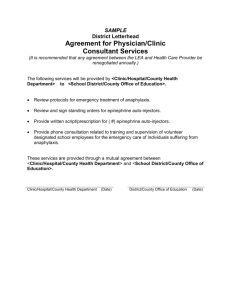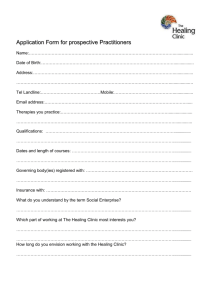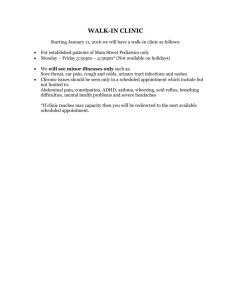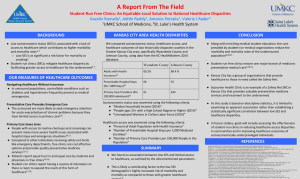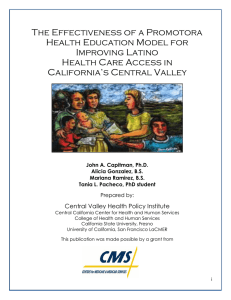Health Literacy at the UCSD Student
advertisement
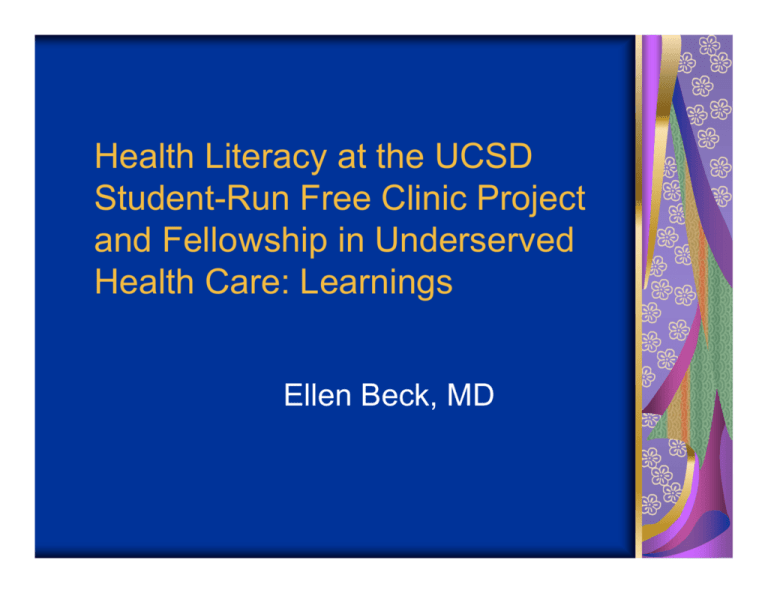
Health Literacy at the UCSD Student-Run Free Clinic Project and Fellowship in Underserved Health Care: Learnings Ellen Beck, MD Goal T oday’s Goal: T echniques and Approaches for Health Literacy across a State T each students, residents, fellows, and faculty concepts and skills in health Literacy Community Empowerment- T each patients concepts and skills in Health Literacy Outline Background Approaches Effectiveness What seems to work What we hope to study My own background McGill University Working Department of Community Health-Elderly services, education, community programs, mental health services Directed a clerkship for McGill in primary care and geriatrics My parents and my patients were my greatest teachers As a resident, Ran a program for the elderly in health education—told them that rather than teaching medical students how to take a medical history, it seemed easier to teach the clients how to give a medical history, they practiced “ chief complaint, my past medical history, etc… UCSD Student-Run Free Clinic Project UCSD Student-Run Free Clinic Project Founded in 1997 4 sites Community Partners: 2 “social justice” churches, already serving the underserved 2 inner city elementary schools Free Clinic Project 2000 patients “safety net” for the safety net, San Diego-very limited safety net, many fall through the cracks No other resources Provide continuous, comprehensive high quality health care to people without access to care Population 51% Latino, 30% Caucasian, 9% AfricanAmerican,7% Asian, 4% other or not stated 25% street homeless 51% women, 49% male, 85% with chronic illness: Hypertension, Hyperlipidemia, Diabetes, Asthma, Depression All do not qualify for and/or cannot afford access to care Core philosophy Empowerment Humanistic Trans-disciplinary Community as T eacher T aught, modeled, and expected throughout all activities Empowerment Create an environment in which the other: individual, family, community take charge of their life and achieve joy and wellbeing Esperanza Empowerment Group Member 3 years “When I first came to the group, I was carrying a lot, and I let everything out. I cried a lot and since then, everybody in the group has helped me to think, to defend myself, to move forward without fear. Everything I hear here, I share with my family and they also are changing. I was in the hospital recently and they gave me a lot of support. I want this group to continue and want to invite a lot of people so that they also can listen and learn not to have fear and to move forward. This is my home and I want to share it with everybody.” Irma Empowerment group member 4 years …Before coming to this group, I did not know how to control my temper and I did not know how to speak with my children or my husband. Now I feel like a different person. I know how to control my temper. I know how to speak to my children. Now I know how to get along with myself better. Before, I didn’t value myself. I didn’t take time for myself. I feel much better about myself. Thanks to all of you….For me, this group is like a family, something beautiful that happened in my life, this experience, this support….Ojala! I wish I can continue to come and to share.” Humanistic Rogerian person-centered approach Empathy Congruence: Self-awareness Positive Regard: Respect Community as T eacher Transdisciplinary All fields working together with the patient at the center Dispel hierarchies and existing stereotypes and inter-professional prejudices “Culturally Humble” Students/TraineesUCSD Medical Students 105 first year-complete required elective 70 first and second year, each quarter-elective Some third year-continuity site and selectives 80 fourth year four week clerkship either in Family Medicine or Underserved Medicine Students learn to teach Transdisciplinary Pharmacy students-all first year, many third and fourth year Pre-dental students Acupuncture students: Pacific College of Oriental Medicine Social Work Interns: San Diego School of Social Work Law Students: California Western School of Law 182 Diabetic Patients Process outcomes Had the following test within the last year Blood Pressure HA1C LDL TG HDL Microalbumin 100% 99% 93% 88% 88% 80% Marrone, L., Smith, S., Johnson, MJ, Beck, E Independent Study Project, UCSD 2010 182 Diabetic Patients Intermediate Outcomes • • • • • LDL <100 70% LDL <130 86% BP <130/80 46% BP<140/90 77% Mean HA1C 8.26% Marrone, L., Smith, S., Johnson, MJ, Beck, E Independent Study Project, UCSD 2010 What we do T each the philosophy: through examples, role modeling, weekly reflection sessions, community building, didactics that include topics such as health promotion, health education, and working with interpreters, social resources What we do Medical students-first and second year Medical students-fourth year Pharmacy students Comprehensive Wellness Program Inner City Elementary School Children-Wellness T eachers-components of wellness, physical and emotional, creativity, expression, meaning Blue Bandaid Brigade and Junior Health Promoters( Increasing Health Literacy) T eachers-Professional Renewal Parents-Access to Healthcare and Education and Classes( Increasing Health Literacy) Environment-Gardens, Murals, Learning environment What we do at the Free Clinic Project T each Back method->>>>Pretend that you are the doctor and I am the patient, or let’s switch roles, and teach me what I have just taught you. Barriers Reduction: Identify what barriers are preventing someone from taking charge of their life and their health, and with them, help to reduce those barriers Consider Social Determinants of Health Personal prescriptions: Sources of stress and Sources of Strength Other factors That Affect Health Literacy Fear: Working with clients to address their fears-teaching fear management tools Trust: Being ‘trust bridges’, Helping people build trust Stigma: Address concepts of stigma and how to overcome it Knowledge: Classes, sharing knowledge, adult education model Time What we do Community Health Promoters/Promotoras Empowerment Group Blue Bandaid Brigade: Youth Health Promoters Client health literacy Clinician health literacy Ethical Issues and Reflections Promotoras Introduce students to the clinic promotoras, explain and value the importance of their role They come to the medical school to teach the students, They are available during clinic to help problem solve and consult. They co-facilitate the empowerment group. T each principles and practice of community partnership At weekly on-site check-in sessions, introduce the social worker and CEO of one of our key partners, and explain how we are ‘guests in their house’. T eaching session offered by promotoras at university Student perceived self-efficacy with the underserved pre-post first free clinic elective N=431 medical students who took elective between 2001-2001 . Students' perception of self-efficacy with care of the homeless, minority families, and women and children all improved (all p<0.001). Attitudes towards the care of the homeless and minority families improved (p<0.001, p=0.0283 respectively). Students reported an increase in interest in primary care, as well as increased interest in working with the underserved (both p<0.001). Yoon, R., Johnson, M., Smith, S., Beck, E. Independent Study Project, 2009 Fellowship in Underserved Health Care 1-2 year Fellowship in Underserved Health Care Medicine, then expanded to Dentistry, Acupuncture, now Pharmacy, hopefully mental health, law, nursing Help direct the free clinic project and complete a project and training 6 medical fellows, 5 were previously student leaders at the free clinic project, now they have returned to be the role models and clinic directors, supervising all aspects of care 2 dental fellows All now work with the underserved National Faculty Development Addressing Health Needs of the Underserved 135 faculty 30 states 25% from underrepresented minorities in the health professions 3 areas of focus: faculty development skills community partnerships and programs personal and professional renewal Faculty Development Program Age Range of Participants 40-49 35% 50-59 13% 60-69 4% 70+ 1% 30-39 42% 20-29 5% Faculty Development Program Outcomes: Pre-post Change in overall confidence in being able to demonstrate your proficiency in the following skills N: 40 of 49 participants of the 2003, 2005, 2006, 2007 Pre-Post Change: Mean 4.00 3.50 Overall change 48.36% 3.00 2.50 2.00 1.50 1.00 0.50 0.00 2.62 3.73 Defining Promotora 118% Designing a Promotora Program 123% PROMOTORAS 5.00 4.50 4.00 3.50 3.00 2.50 2.00 1.50 1.00 0.50 0.00 Defining Promotora Designing a promotora program 1 2 Designing student curricula related to underserved communities 4.50 4.05 4.00 3.50 3.00 2.54 2.50 2.00 1.50 1.00 0.50 0.00 PRE POST Designing a student or resident-run free clinic project 4. 00 3 . 80 3. 50 3. 00 2 . 36 2. 50 2. 00 1. 50 1. 00 0. 50 0. 00 P RE P OS T Comparing Cultural Skills Outcomes: Programs and Projects 60 Percent Increase 50 48 40 32 30 20 12 10 0 Developing an educational component or experience addressing issues of culture and race Teaching about issues of culture and race Cultural competency Developing occupational health/environmental medicine curricula Designing a COPC project or educational experience Defining COPC Designing a Community Medicine Rotation Designing a Needs Assessment Developing community-oriented curricula or programs 1.58 2.98 89 1.96 3.66 87 2.09 3.87 85 2.13 3.68 73 2.27 3.73 64 2.58 3.83 48 2.52 3.73 48 Developing an educational component or experience addressing issues of culture and race 2003: Outcomes after first 53 participants 7 new or improved student-run free clinic projects 19 new student curricula 30 new resident curricula 21 PI or co-investigator for a grant 35 new leadership roles What we have learned Ownership Coaching and role modeling Orientation re philosophy and specific expectations T eaching students to be teachers Showing the students that the patients and community are truly the teachers: On siteDirectly related to patient care group reflection that starts and ends a session and in class, related to patient care What can be done at the state level What lessons have we learned Ownership: If the students feel directly involved in care and education, they will take responsibility Involve community members in the training, the teaching and the role modeling Role Models, supervisors that have lived and can teach the philosophy Philosophy that is transmitted, practiced and expected



